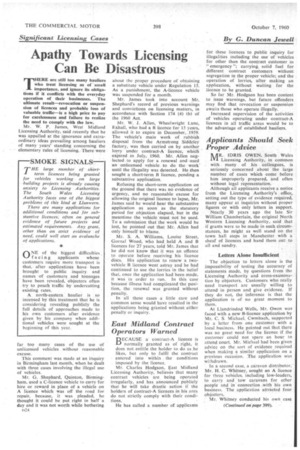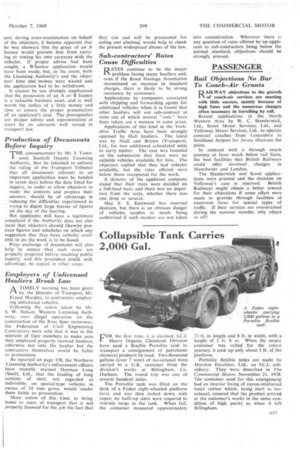Apathy Towards Licensing Can Be Disastrous
Page 72

Page 75

If you've noticed an error in this article please click here to report it so we can fix it.
THERE are still too many hauliers who treat licensing as of small. . importance. and ignore its obligations if it conflicts with the everyday operation of their businesses. The ultimate result—revocation or suspension of licences and probable loss of valuable traffic—is a high price to pay for carelessness and failure to realize the need to comply with the law.
Mr. W. P. James, West Midland Licensing Authority, said recently that he was appalled at the ignorance and extraordinary ideas. prevailing among hauliers of many years' standing concerning the elementary rules of licensing. -There-were
far too many cases of the use of unlicensed vehicles without reasonable excuse.
This comment was made at an inquiry in Birmingham last month, when he dealt with three cases involving the illegal use of vehicles.
Mr. G. Shephard, Quinton, Birmingham, used a C-licence vehicle to carry for hire or reward in place of a vehicle on A licence which was off the road for repair, because, it was pleaded, he thought it could be put right in half a day and it was not worth while bothering about the proper procedure of obtaining a substitute vehicle under Regulation 15. As a punishment, the A-licence vehicle was suspended for a month.
Mr. James took into account Mr. Shephard's record of previcius warnings and convictions on licensing matters, in accordance with Section 174 (4) (b) of the 1960 Act.
Mr. W. J. Allen, Wheelwright Lane, Exhall, who had a B licence for 15 years, allowed it to expire in December, .1959. The vehicle's main work of rubbish disposal from• the Armstrong Siddeley factory, was then carried on by another lorry 'under contract-A licence, which expired in July,. 1960. Mr. Allen neglected to apply for a renewal and used an unlicensed vehicle, to do the . Work' until the illegality was detected. He then sought a short--terrn B licence, pending a
substantive application. • Refusing the short-term application on the ground that there was no evidence of urgency, and no reasonable excuse for allowing the original licence to lapse, Mr. James said he would hear the substantive application as soon as the statutory period for objection elapsed, but in the meantime the vehicle must not be used. To a submission that the work would be lost, he pointed out that Mr. Allen had only himself to blame.
Mr. S. A. Williams, Louise Street, Gornal Wood, who had held A and B licences for 27 years, told Mr. James that he did not know that it was an offence to operate before receiving his licence . discs. His application to renew a twovehicle B licence went astray and he had continued to use the lorries in the belief that, once the application had been made, it was in order to run. In this case because illness had complicated -the position, the renewal was granted without penalty.
In all these cases a little care and common sense would have resulted in the applications being granted without either penalty or inquiry.
East Midland Contract Operators Warned
BECAUSE a. contract-A licence is normally granted as of right, it does not entitle the holder to do as,he
likes, but only to fulfil the contract entered into within . the conditions . imposed by the licence.
Mr. Charles Hodgson, East Midland Licensing Authority, believes that many contract vehicles are being operated irregularly, and has announced publicly that he will take drastic action if the holders of contract-A licences in his area do not strictly comply with their condi tions. • He has called a number of applicants for these licences to public inquiry for illegalities including the use of vehicles for other than the contract customer in " emergency "; carrying solid fuel for different contract customers without segregation in the proper vehicle; and the operation of lorries, after making an application, without waiting for the licence to be granted.
So far Mr. kiodgson has been content to issue warnings, but future offenders may find that revocation or suspension awaits those who operate illegally.
Increased supervision of the activities of vehicles operating under contract-A licences in all traffic areas would be to the advantage of established hauliers.
Applicants Should Seek Proper Advice
MR. IDRIS OWEN, South Wales Licensing Authority, in common with many, of his colleagues, is seriously concerned about the large number of cases which come before him improperly prepared, and often without legal representation.
Although all applicants receive a notice from the Licensing Authority's office, setting out the type of evidence required, many appear at inquiries without proper figures or with only letters in support.
Nearly 30 years ago the late. Sir William Chamberlain, the original North Western Licensing Authority, said that if grants were to be made in such circumstances, he might as well stand on the town hall steps in Manchester with a sheaf of licences and hand them out to all and sundry.
Letters Alone Insufficient
• The objection to letters alone is the impossibility of testing the accuracy of statements made, by questions from the Licensing Authority and cross-examination by objectors. Customers who realty need transport are usually willing to attend in person and give evidence. If they do not, the inference is that the application is of no great moment to them.
At Llandrindod Wells, Mr. Owen was faced with a new B-licence application by Mr. C. S. Michael, Cw.mbach, supported by a letter from one customer with a local business. He pointed out that there was no great need for the licence if the customer could not spare an hour to attend court. Mr. Michael had been given advice on the sort of evidence required when making a similar application on a previous occasion. .The application was withdrawn.
In a seeond case, a caravan distributor. Mr. H. C. Whittiey, sought an A licence for three vehicles, including low-loaders, to carry and tow caravans for other people and in connection with his own business. The application attracted four objectors,
Mr. Whitney conducted his own case
and, during cross-examinationon behalf, of the objectors, it became apparent that he was unaware that the grant of an A licence would prevent him from carrying or towing his own caravans with the vehicles. If proper advice had been sought, a B-licence application would have been made, but, in the event, both the Licensing Authority's and the• objectors' time and money were wasted and the application had to be withdrawn.
It cannot be too strongly emphasized that the. possession of an A or B licence is a valuable business asset, and is well worth the outlay of a little money and time to ensure the proper presentation of an applicant's case. The prerequisites are proper advice and representation at court by an advocate well versed in transport law.
Production of Documents Before Inquiry
THE announcement by Mr. I. Town]. send, Scottish Deputy Licensing Authority, that he intended to ehforce the ruling of the Transport Tribunal that all documents relevant to an important appli6ati-on must be handed in seven days before the date listed for inquiry, in order to allow objectors to study the contents and prepare their answers, should be of advantage in reducing the difficulties experienced in trying to digest large masses of figures on the day of the hearing.
But applicants will have a legitimate complaint if the Authority does not also insist that objectors should likewise produce figures and schedules on which any suggestion that they have vehicles available to do the work is to be based.
Prior exchange of documents will also help to ensure 'that such cases are properly prepared before reaching public inquiry, and this procedure could, with advantage, be copied in other areas:"
Employers of Unlicensed Hauliers Break Law
ATIMELY warning has been given by the Minister of Transport, Mr. Ernest Marples, to contractors employ
ing unlicensed vehicles.
Following the action taken by Mr. S. W. Nelson, Western Licensing Authority, over illegal operation on the construction of the Ross Spur motorway. the Federation of Civil Engineering Contractors were told that it was in the interests of their members to make sure they employed properly licensed hauliers, otherwise not only the haulier but the contractors themselves would be liable to prosecution.
As reported on page 378, the Northern Licensing Authority's enforcement officers have recently warned Dorman Long (Steel), Ltd., that the loading of long sections of steel, not regarded as indivisible, on special-type vehicles in excess of 24 tons gross, would render them liable to prosecution.
More action of this kind, to bring home to users of transport that is not properly licensed for the job the fact that they can and will be prosecuted for aiding and abetting; would help to check the present widespread abuses of the law.
Sub-contractors' Rates Cause Difficulties
RATES continue to be the major problem facing many hauliers and, even if the Road Haulage Association recommend an increase in standard charges, there is likely to be strong resistance by customers.
Applications by companies associated with shipping and forwarding agents for additional vehicles when it is found that other hauliers will not sub-contract at rates Out of which several " cuts " have been taken, are a menace in some areas.
Applications of this kind in the Yorkshire Traffic Area. have been strongly opposed by Hull hauliers. The latest was by Neill and Brown (Transport), Ltd„ for two additional articulated units to carry timber. The case was founded on the submission that there were no suitable vehicles available for hire. The objectors replied that they •had vehicles available, but the rates offered were below those recognized for the work.
A director of the applicant company stated that their rates were decided on a full-load basi:, and there was no departure from the scale, whether there was one drop or several.
Maj. F. S. Eastwood has reserved decision; but there is an obvious danger of vehicles surplus to needs being authorized if such matters are not taken into consideration. Wherever there is any question of rates offered by an applicant to sub-contractors being below the normal standard, objections should be strongly pressed.
PASSENGER
Rail Objections No Bar To Coach-Air Grants
RAMWAY objections to the growth of coach-air services are meeting with little success, mainly because of
high fares and the numerous changes often necessary in travelling by rail.
Recent applications in the North Western Area by W. C. Standerwick, Ltd., Scout Motor Services, Ltd., and Yelloway Motor Services, Ltd., to operate contract coaches from Lancashire to Southend Airport for Jersey illustrate the point.
In contrast with a through coach journey at fares much below rail fares,• the best facilities that British Railways could offer involved changes in Manchester and London.
The Standerwick and Scout applications were granted and the decision on Yelloway's case is reserved. British Railways might obtain a better reward for their objections if some effort were made to provide through facilities at excursion fares for special types_ of traffic. If their services are overstrained during the summer months, why object at all?
































































































































